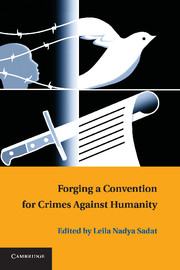Book contents
- Frontmatter
- Contents
- Figures and Maps
- Crimes Against Humanity Initiative: Steering Committee
- Biographies of Contributors
- Foreword
- Preface and Acknowledgments
- Crimes Against Humanity and the Responsibility to Protect
- 1 History of Efforts to Codify Crimes Against Humanity
- 2 The Universal Repression of Crimes Against Humanity before National Jurisdictions
- 3 Revisiting the Architecture of Crimes Against Humanity
- 4 The Bright Red Thread
- 5 Gender-Based Crimes Against Humanity
- 6 “Chapeau Elements” of Crimes Against Humanity in the Jurisprudence of the UN Ad Hoc Tribunals
- 7 The Definition of Crimes Against Humanity and the Question of a “Policy” Element
- 8 Ethnic Cleansing as Euphemism, Metaphor, Criminology, and Law
- 9 Immunities and Amnesties
- 10 Modes of Participation
- 11 Terrorism and Crimes Against Humanity
- 12 Crimes Against Humanity and the International Criminal Court
- 13 Crimes Against Humanity and the Responsibility to Protect
- 14 Re-enforcing Enforcement in a Specialized Convention on Crimes Against Humanity
- 15 Why the World Needs an International Convention on Crimes Against Humanity
- Appendices
- Testimonials and Endorsements
- Index
- References
4 - The Bright Red Thread
The Politics of International Criminal Law – Do We Want Peace or Justice? The West African Experience
Published online by Cambridge University Press: 01 June 2011
- Frontmatter
- Contents
- Figures and Maps
- Crimes Against Humanity Initiative: Steering Committee
- Biographies of Contributors
- Foreword
- Preface and Acknowledgments
- Crimes Against Humanity and the Responsibility to Protect
- 1 History of Efforts to Codify Crimes Against Humanity
- 2 The Universal Repression of Crimes Against Humanity before National Jurisdictions
- 3 Revisiting the Architecture of Crimes Against Humanity
- 4 The Bright Red Thread
- 5 Gender-Based Crimes Against Humanity
- 6 “Chapeau Elements” of Crimes Against Humanity in the Jurisprudence of the UN Ad Hoc Tribunals
- 7 The Definition of Crimes Against Humanity and the Question of a “Policy” Element
- 8 Ethnic Cleansing as Euphemism, Metaphor, Criminology, and Law
- 9 Immunities and Amnesties
- 10 Modes of Participation
- 11 Terrorism and Crimes Against Humanity
- 12 Crimes Against Humanity and the International Criminal Court
- 13 Crimes Against Humanity and the Responsibility to Protect
- 14 Re-enforcing Enforcement in a Specialized Convention on Crimes Against Humanity
- 15 Why the World Needs an International Convention on Crimes Against Humanity
- Appendices
- Testimonials and Endorsements
- Index
- References
Summary
INTRODUCTION
International criminal law is about politics. It is a naïve Chief Prosecutor who plans for and executes his prosecution plan (if he or she has one) without keeping in mind the bright red thread of politics that permeates the entire existence of a tribunal or court. Conceived due to a political event and a creature of political compromise, politics is in the DNA of all of the justice mechanisms that make up the modern era of international criminal justice.
Today, the climate is once again politically charged as the international community begins to adjust its thinking about how to solve diplomatically, in an acceptable manner, the indictment of the sitting President of the Sudan, Omar al-Bashir. The clarion calls by various States and organizations for peace first, maybe justice later, with a mounting pressure to defer the arrest warrant for a year, are familiar. These threats, comments, and histrionics are the very same as when I unsealed the indictment of then-President Charles Taylor of Liberia in June 2003. At the end of the day, his indictment brought a more sustainable peace for the people of Liberia, and Bashir's indictment will do the same for the people of the Sudan. It will be interesting to watch how this political process plays out.
This paper will use as a case study the development, planning, and execution of a political event that ultimately set into motion the prosecution of the various warring factions of Sierra Leone in the 1990s.
- Type
- Chapter
- Information
- Forging a Convention for Crimes against Humanity , pp. 59 - 77Publisher: Cambridge University PressPrint publication year: 2011
References
- 3
- Cited by



